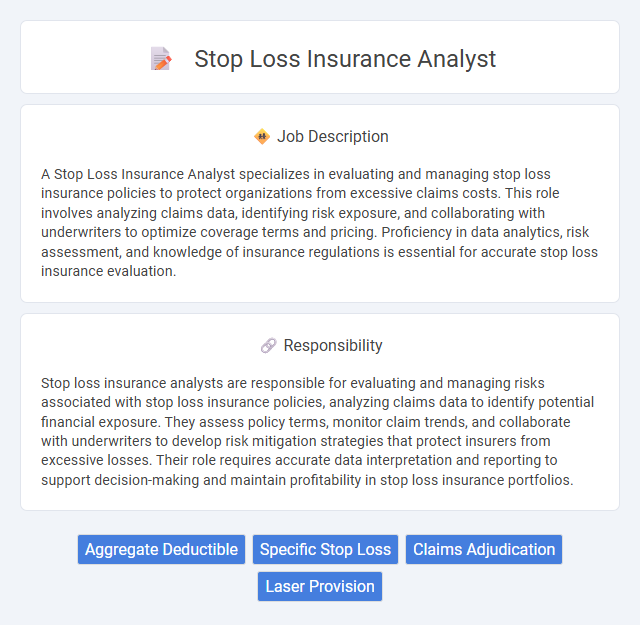
A Stop Loss Insurance Analyst specializes in evaluating and managing stop loss insurance policies to protect organizations from excessive claims costs. This role involves analyzing claims data, identifying risk exposure, and collaborating with underwriters to optimize coverage terms and pricing. Proficiency in data analytics, risk assessment, and knowledge of insurance regulations is essential for accurate stop loss insurance evaluation.
Individuals with strong analytical skills and an interest in risk assessment are likely to thrive as stop loss insurance analysts. People who enjoy examining data, forecasting trends, and working in high-stakes environments may find this role suitable. Those who prefer routine tasks or lack attention to detail might struggle to meet the demands of this position.
Qualification
A Stop Loss Insurance Analyst must possess strong analytical skills and expertise in risk assessment to evaluate stop loss insurance policies accurately. Proficiency in actuarial science, finance, or related fields, along with experience in data modeling and statistical analysis software such as Excel, SAS, or R, is essential. Effective communication skills are also critical to interpret complex insurance data and provide actionable insights to underwriting teams and clients.
Responsibility
Stop loss insurance analysts are responsible for evaluating and managing risks associated with stop loss insurance policies, analyzing claims data to identify potential financial exposure. They assess policy terms, monitor claim trends, and collaborate with underwriters to develop risk mitigation strategies that protect insurers from excessive losses. Their role requires accurate data interpretation and reporting to support decision-making and maintain profitability in stop loss insurance portfolios.
Benefit
Stop loss insurance analysts likely play a crucial role in identifying and managing risk exposure for insurance providers, which can significantly benefit companies by potentially reducing unexpected financial losses. They may analyze claims and policy data to optimize stop loss coverage, improving cost efficiency and ensuring financial stability. This role probably enhances the overall risk management strategy, increasing the likelihood of better decision-making and improved profitability for insurers.
Challenge
The stop loss insurance analyst role likely involves complex data evaluation to identify potential risks and cost exposures, presenting a continuous challenge in accuracy and forecast reliability. Navigating evolving regulations and market conditions may add layers of difficulty in maintaining effective risk mitigation strategies. This position probably demands strong analytical skills and adaptability to address the unpredictable nature of insurance claims and coverage limits.
Career Advancement
Stop loss insurance analysts focus on evaluating risk and claims data to determine appropriate coverage limits and premiums, crucial for managing financial exposure in insurance firms. Career advancement opportunities in this field include progressing to senior analyst roles, risk management positions, or underwriting management, often requiring enhanced expertise in data analytics and regulatory compliance. Developing skills in actuarial science, financial modeling, and industry software can significantly accelerate promotion prospects and lead to strategic decision-making roles within insurance companies.
Key Terms
Aggregate Deductible
Stop loss insurance analysts specialize in evaluating risks associated with aggregate deductible limits to protect employers or insurers from excessive claims. They analyze historical claims data and trend patterns to set appropriate aggregate deductibles that balance financial exposure and premium costs. Proficient in actuarial modeling and loss forecasting, these analysts help optimize stop loss coverage structures to safeguard against aggregate losses exceeding predetermined thresholds.
Specific Stop Loss
Specific Stop Loss insurance analysts evaluate and manage risks related to high-cost individual claims exceeding predefined thresholds within employer self-funded health plans. They analyze claim data, assess policy retention levels, and collaborate with underwriting teams to optimize stop loss coverage, ensuring financial protection against catastrophic losses. Proficiency in healthcare claims analytics and risk modeling is essential for accurately pricing and monitoring specific stop loss policies.
Claims Adjudication
A Stop Loss Insurance Analyst specializing in claims adjudication evaluates and processes claims to determine policy coverage and adherence to contract terms. This role requires expertise in analyzing large claim datasets, verifying claim accuracy, and ensuring compliance with stop loss insurance policies to mitigate financial risks for insurers. Proficiency in claim review systems and strong knowledge of healthcare billing codes are essential for accurate adjudication and preventing improper payments.
Laser Provision
Stop loss insurance analysts specializing in Laser Provisions evaluate and underwrite policies that exclude specific high-risk claims, ensuring accurate risk assessment and premium calculation. They analyze claimant medical histories and exposure data to identify potential laser conditions impacting coverage limits. Expertise in laser provision clauses enables precise policy customization, optimizing risk management for self-insured employers and insurance carriers.
 kuljobs.com
kuljobs.com